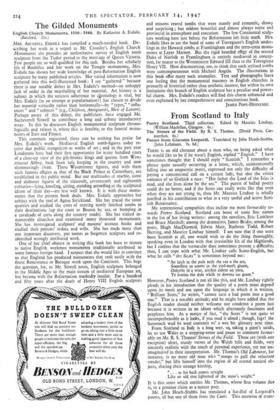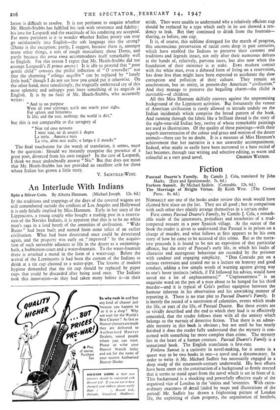From Scotland to Italy
THERE is an old chestnut about a man who, on being asked what he would like to be if he wasn't English, replied "English." I have sometimes thought that I should reply "Scottish." I remember a phrase quite casually occurring in a letter, which, unintentionally falling into an anapaestic metre, expressed not only the difficulty of paying a conventional call on a certain lady, but also the entire rottance of so Gothick a race: "Her father the Lord of the Isles is mad, and she lives alone by the sea." The purest of ballad poetry could do no better, and if the Scots can really write like that even when they are not trying to, then Mr. Maurice Lindsay is wholly justified in his contribution to what is a very useful and active Scot- tish Renaissance.
My septentrional sympathies thus incline me most favourably to- wards Poetry Scotland. Scotland can boast of some fine names in the list of her living writers: among the novelists, Eric Linklater and Bruce Marshall; among the dramatists, James Bridie; among the poets, Hugh MacDiannid, Edwin Muir, Ruthven Todd, Robert Herring, and Maurice Lindsay himself. I am sure that if one were born Scottish at all, one would wish to do the thing thoroughly, speaking even in London with that irresistible lilt of the Highlands, but I confess that the vernacular does sometimes present a difficulty; thus, I can cope with what Mr. Lindsay calls Scoto-English, but what he calls "the Scots" is sometimes beyond me: "An laich in the pule neth the rax o the am,
Soondless ye soomt in the yird-marlt gloam, Onkytht in a wint, airchin cident an yarn, Ye kentna the dale whilk ye dowtna tae goam."
However, Poetry Scotland is not all like this, and Mr. Lindsay rightly pleads in his introduction that the quality of a poem must depend upon its merit and not upon the language in which it is written. "Brilliant Scots," he writes, "cannot turn a bad poem into a good one." That is a sensible attitude; and he might have added that the English reader should neither welcome nor condemn a poem just because it is written in an idiom which alternately fascinates and perplexes him. As a matter of fact, "the Sects" is not quite so incomprehensible as it looks, if you read it aloud ; though, fegs! the Sassenach wud be wed contentit wi' a wee bit glossary next time.
From Scotland to Italy is a long way, so, taking a giant's stride, let us use Wales as a stepping-stone and, pause to comment favour- ably on Mr. R. S. Thomas' Stones of the Field. These are (with one exception) short, sturdy verses of the Welsh hills and fields, very sincerely realistic with the touch of personal experience, yet not un- imaginatis4 in their interpretation. Mr. Thomas's Old Labourer, for instance, is no mere old man who "stoops to pull the reluctant swedes," but lifts himself into the region of all eternal natural ob- jects, sharing their strange kinship, " . as his back comes straight Like an old tree lightened of the snow's weight."
It is this sense which entitles Mr. Thomas, whose first volume this is, to a genuine claim as a nature poet.
Mr. John Heath-Stubbs has translated a handful of Leopardi's poems, all but one of them front the Conti. This question of trans-
lation is difficult to resolve. It is not pertinent to enquire whether Mr. Heath-Stubbs has fulfilled his task with reverence and fidelity: his love for Leopardi and the exactitude of his rendering are accepted. Far more pertinent is it to wonder Whether Italian poetry can ever go satisfactorily into English—the soft language into the strong? (Dante is the exception; partly, I suggest, because there is, amongst many other things, a sort of rough masculinity about Dante, and partly because the terza rima accommodates itself remarkably well to English. For this reason I regret that Mr. Heath-Stubbs did not attempt Leopardi's II prim° amore.) It is idle to pretend that "poor gentle child" conveys the pitiful inflection of "0 tenerella!" nor that the charming "solingo augellin " can be replaced by "lonely little bird," though I do not see how you could put it otherwise. On the other hand, most tantalisingly, the tragically embittered cry of this most splenetic and unhappy poet loses something of its anguish in English. It is by no fault of Mr. Heath-Stubbs, who accurately writes :
"And to no purpose Were all your stirrings; earth not worth your sighs. For spleen and bitterness Is life; and the rest, nothing; the world is dirt," but this is not comparable to the savagery of "Non val cosa nessuna I moti tuoi, ne di sospiri e degna La terra. Amaro e noia La vita, altro mai nulla; e fango ê il mondo."
The final touchstone for the worth of translation, it seems, must be the question: Should we instantly recognise the presence of a great poet, divorced from his own tongue? In the case of Leopardi, I think we must undoubtedly answer "No." But that does not mean that Mr. Heath-Stubbs has not provided an excellent crib for those whose Italian has grown a little rusty.
V. SAC.KVILLE-WEST.



































 Previous page
Previous page